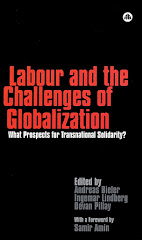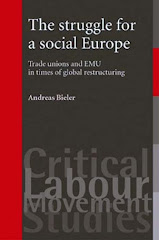Tuesday 21 December 2010
Trade union leader calls for co-ordinated action against cuts
In a contribution to the Guardian on Sunday, 19 December, Len McCluskey, the General Secretary of the powerful trade union Unite, called for co-ordinated action between students and trade unions against the public sector cuts of the Con-Dem government. Unless trade unions follow the students’ example of resistance, these cuts could not be stopped. ‘It is our responsibility’, he argued, ‘not just to our members but to the wider society that we defend our welfare state and our industrial future against this unprecedented assault’.
Friday 10 December 2010
Resistance against cuts to further and higher education in the UK
Current Con-Dem government plans to cut back funding for further and higher education in the UK are an unprecedented attack on the right to access to higher education. This attack affects students and members of staff alike, but co-operation between both sides is neither secured nor automatic. Anybody interested in successful resistance will have to think carefully about how to co-ordinate the various struggles.
Monday 22 November 2010
Chinese labour in the global economy
Prof. Andreas Bieler has been awarded a grant of £275k by the Economic and Social Research Council (ESRC) for a project on ‘Globalisation, national transformation and workers’ rights: an analysis of Chinese labour within the global economy’ (RES-062-23-2777). The project will be located in the Centre for the Study of Social and Global Justice and includes a three-year fellowship for Dr. Chun-Yi Lee, who will be responsible for the empirical research in China. The project will start in October 2011 and run for three years.
Tuesday 26 October 2010
The Con-Dem Budget as a class project
What attitude should one take towards last week’s Comprehensive Spending Review by the UK government? That all depends on one’s point of view. Neo-liberals take a different view from that of Keynesian analysts. And it is a Marxist understanding, which uncovers the underlying class dynamics.
Friday 8 October 2010
‘No ifs, no buts, no public sector cuts!’ – Trade union demonstration in Birmingham on 3 October 2010.
The coalition government of Conservatives and Liberal Democrats is in the process of unveiling its budget cuts in order to address the national debt level resulting from the bailout of failing banks during the financial crisis. In practice, this means significant cuts in public sector spending of 25 per cent in each department affecting amongst others child benefit payments, school refurbishment programmes, services for people with disabilities, etc. Everybody should do his/her bit in order to get debt levels under control, it is argued. What sounds rather reasonable at first sight, however, masks three important facts.
Tuesday 28 September 2010
‘No to austerity. Priority for jobs and growth!’ – Widespread resistance against public sector cuts in Europe.
Bankers caused the financial market crisis through their mistakes, but it is now the people, who are asked to pay for it. While many banks are back on profitable routes (see, for example, The Telegraph, 6 August 2010), citizens across Europe are expected to pay for the bailouts of banks, be it in the form of unemployment, be it in the form of wage cuts, be it in the form of cut-backs in public services. It is now that governments across Europe cut back on public services including health, education and other social services for disadvantaged groups in society. As Will Hutton wrote in the Guardian on 26 September in relation to the forthcoming budget of the British government, ‘while the country is now exhorted to tighten its belt and pay off its debts, those who created the crisis — the country’s CEOs and bankers, still living on Planet Extravagance, not to mention mainstream politicians — all want to get back to "business as usual": the world of 1997 to 2007’ (Guardian, 26 September 2010).
But workers are not only victims.
But workers are not only victims.
Thursday 23 September 2010
Emerging resistance against budget cuts and the problems with New Labour
On Wednesday, 22 September at 7.30 pm a public meeting took place in Nottingham/UK to discuss and organise resistance against cuts in the public sector at the local level. The meeting was addressed by representatives from the local Trades Union Council, the Communication Workers’ Union, the National Union of Teachers, UNISON as well as a whole range of local campaigns against Mental Health cuts, Learning Disability cuts and School Building cuts amongst others.
Tuesday 14 September 2010
Globalisation and Trade Unions: different challenges and a variety of responses.
 Globalisation has put national labour movements under severe pressure due to the increasing transnationalisation of production and informalisation of the economy. In a new edited collection, labour academics, trade union researchers and social movement activists analyse concrete instances of successful as well as failed strategies to draw out possibilities of, but also obstacles to, transnational labour solidarity in times of global restructuring.
Globalisation has put national labour movements under severe pressure due to the increasing transnationalisation of production and informalisation of the economy. In a new edited collection, labour academics, trade union researchers and social movement activists analyse concrete instances of successful as well as failed strategies to draw out possibilities of, but also obstacles to, transnational labour solidarity in times of global restructuring.
Bieler, Andreas and Ingemar Lindberg (eds.) (2010) Global Restructuring, Labour and the Challenges for Transnational Solidarity. London: Routledge. ISBN 978-0-415-58083-0.
Wednesday 30 June 2010
Finnish trade unions in changing times – Part II: an attack on trade union rights?
Some of the trade union representatives, interviewed in the period of 8 April to 12 May 2010, and here in particular representatives from trade unions organising the workforce in the public and private service sectors, raised the concern that a returned centre-right government around the National Coalition Party and the Centre Party as the result of general elections in 2011 could lead to a more direct attack on trade unions and labour rights in Finland.
Wednesday 19 May 2010
What future for the right to strike in the UK?
Yet again a planned strike was deemed illegal by a High Court judge in the UK. On Monday 17 May, Mr Justice McCombe ruled that Unite, the trade union which organises British Airways (BA) cabin crew, had failed to tell its 12,000 members about the 11 spoilt ballot papers in the last strike vote. This is a clear minor technicality, which in no way affected the overall outcome of the ballot. BA had made a new offer, which was overwhelmingly rejected by trade union members at the beginning of May. In a turnout of 71 per cent, the majority against the proposals was 81 per cent.
Friday 14 May 2010
Finnish trade unions in changing times – Part I: the end of tripartism?
In the period of 8 April to 12 May 2010, I carried out 23 interviews on the Finnish political economy with representatives of Finnish trade unions, employers’ associations, political parties and government ministries. It became clear that Finnish trade unions face significant challenges in currently uncertain and changing times.
Wednesday 5 May 2010
The Winter of Discontent revisited
Due to an increasing number of strikes the current situation has been compared with the so-called Winter of Discontent in 1978/1979. At a closer look, however, there are a number of core differences between then and now. In the 1970s, the struggle was over wage increases and how to control inflation, now it is about rising state debt and increasing unemployment. In the Winter of Discontent, there was a disjuncture between the private and public sector, with the former being able to meet higher demands by workers. Now, both private and public sector are equally affected by the global economic recession and increasing levels of unemployment. Finally, in the 1970s it was easy for trade unions to organize strikes, now they are faced with an extremely complex ballot system.
Friday 23 April 2010
Trade unions and New Labour
With elections looming on the horizon, the relationship between the Labour party and trade unions has gained in importance. When New Labour came to power in 1997, British trade unions were jubilant. Battered by several consecutive Conservative governments with the defeat of the Miners’ Strike in the mid-1980s having been the most visible sign of the government’s attack on trade unions, the British labour movement hoped for a revival of its influence on policy-making and a strengthening of its position within industrial relations. On balance, however, New Labour has not delivered from a trade union point of view.
Thursday 15 April 2010
Right to strike under attack
The right to strike, to withdraw peacefully one’s labour, is a fundamental human right. It is the only option workers have to balance capital’s structural power in the economy. And yet, this right is under severe attack in the UK.
Monday 29 March 2010
The power of Norwegian trade unions
Between 2 and 12 March 2010, I carried out 20 semi-structured interviews with representatives of Norwegian political parties, government ministries, employers’ associations and trade unions in Oslo. My main focus was on the continuity and change in the Norwegian political economy in times of global restructuring. The key result of this field research trip was astonishing: trade unions are in charge!
Monday 22 March 2010
BA cabin crew deserve support
With elections looming on the horizon, the strike by British Airways (BA) cabin crew over a reduction of the number of cabin crew on long haul flights, a two-year pay freeze from 2010 as well as new contracts with lower pay for fresh recruits has gained additional attention.
Subscribe to:
Posts (Atom)











